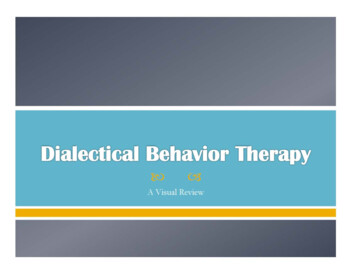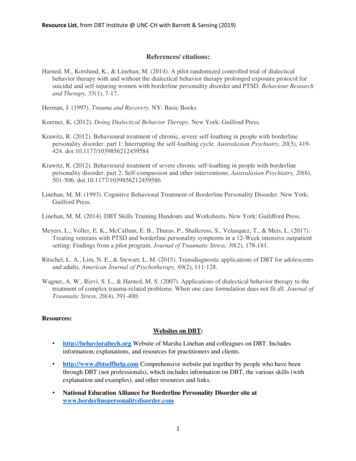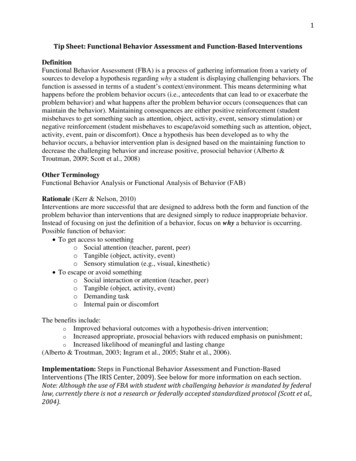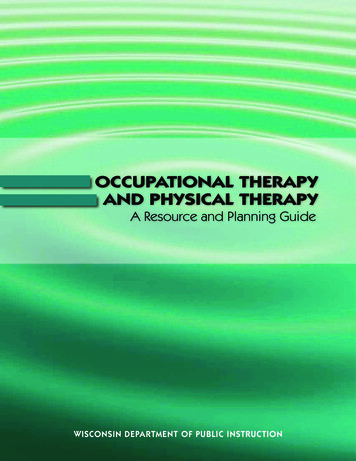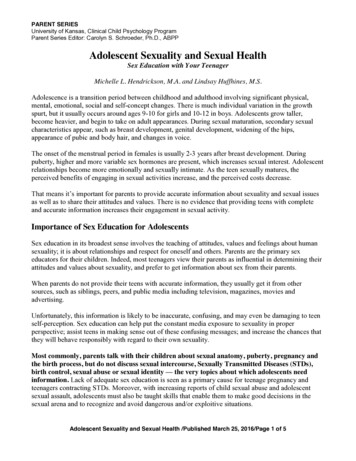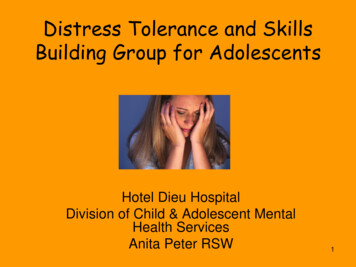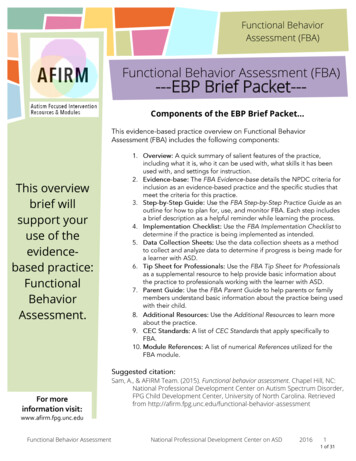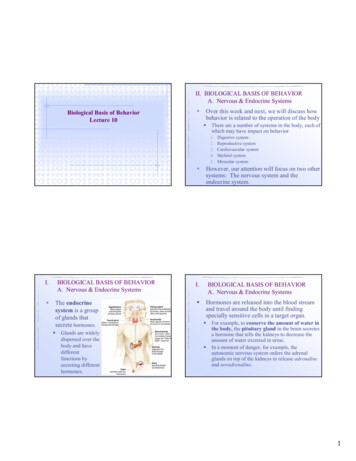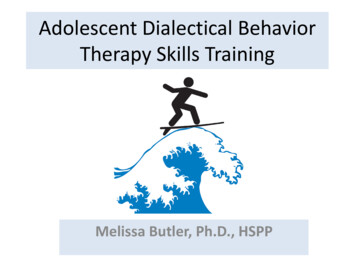
Transcription
Adolescent Dialectical BehaviorTherapy Skills TrainingMelissa Butler, Ph.D., HSPP
What is DBT? “Dialectical BehaviorTherapy” Developed by MarshaLinehan
Development of Adolescent DBTJill Rathus, PhDAlec Miller, PsyD
DBT is helpful for people who have troublecontrolling and regulating their emotions
“What the Heck is DBT?” https://youtu.be/Stz--d17ID4 Created by Esmee Shaller at University ofCalifornia San Francisco
Dialectics Two opposites can be true at the same time Create a new way of viewing the situation
Components of Adolescent DBT Weekly Individual psychotherapyAdditional Family Therapy SessionsMultifamily Group Skills TrainingYouth and Parent Telephone CoachingTherapist Focused ConsultationTeams
Components of Adolescent DBT:Weekly Individual Psychotherapy
Adolescent DBT Skills TrainingModules MindfulnessDistress ToleranceEmotion RegulationInterpersonalEffectiveness Walking the MiddlePath
MODULE 1: Mindfulness Skills
What is Mindfulness? Paying attention On purpose In the present moment Non-judgmentally
Examples of Mindfulness Practice Mindful Breathing MindfulObservation Mindful Eating Mindful Listening Walking the Line
MODULE 2: Distress ToleranceSkills
Distress Tolerance Skills focus on tolerating and surviving crises Skills Include:– Crisis Survival Skills– Reality Acceptance Skills
TIPP Skills – used to change bodychemistry quickly
Temperature
Four Square BreathingRepeat at least 4 times .
Progressive Muscle Relaxation for Kids
Distraction Techniques Count Backwards from100 by 7 (or from 20 by 3) 5-4-3-2-1 GroundingExercise Alphabetize DVDcollection Count Freckles, Ceilingtiles, anything Say alphabet backwards Find the Rainbow
Crisis Survival Kit Usually includes a listof 10 “tools” and anactual kit of items
Radical Acceptance When faced with a difficult problem:– You can problem-solve– Change how you feel about the problem– Accept it– Stay miserable (no skill use)– Make things worse (act on urges) When you can’t solve the problem or changeyour emotions about the problem, tryacceptance
Radical Acceptance Skill of accepting the things you can’t change(Miller, Rathus, & Linehan, 2017, p.304)
MODULE 3: Emotion RegulationSkills
Emotion Regulation1. Understanding andNaming emotionsa. Understanding thefunction of emotionsb. Identifying obstacles tochanging emotionsc. Identifying and labelingemotions2. Changing unwantedemotions3. Reducing Vulnerabilityto Negative Emotions4. Managing extremeemotions and difficultsituations
“Ride the Wave”Skill
Opposite Action Each emotion has anaction urge(sad shut down, isolate) Practice doing theopposite(opposite action be active,be with people)
Pleasant Events List –accumulate positive emotions Meditating, yogaWatching TVGoing for a walkListening to musicTaking a bathColoringPainting nailsPet dog Call a friendRead a bookLighting candlesGetting a massageGo out for coffeeBeing aloneDaydreamingDancing
MODULE 4: InterpersonalEffectiveness Asking for what oneneeds Saying no Managing interpersonalconflicts Skills to maintain closeand intimaterelationships
DEAR MAN Describe the situationExpress your feelingsAssert and ask for what you want or say “no”Reinforce - the person by stating positivebenefits Mindful and stay focused on what you want Appear confident Negotiate – be willing to give to get
GIVE Skills – keeping the relationship Gentle – be nice and respectful, no attacks, nothreats, no judging, no sneering Act Interested Validate – with words and actions that youunderstand the other person’s feelings andthoughts Easy Manner – smile, use humor, leaveattitude at the door
Module 5: Walking the Middle PathSkills Covered: Works on balancingacceptance andchange Validation skills Behavioral ChangeStrategies
Validation vs. InvalidationInvalidationIncreasedConflict &Distress
Validation Validation – communicates that a person’sfeelings, thoughts, and actions are understandable Invalidation – communicates that a person’sfeelings, thoughts, actions in a particular situationmake no sense. “manipulative” “stupid” “overreaction” “attentionseeking,” or not worthy of time, interest, orrespect
We can invalidate with the best ofintentions . Jane: “I’m a terrible person.” Jenny: “What are you talking about? You’regreat.”
Validation The Validation skill is rated by adolescents andparents as the most helpful (Rathus et al., 2015)
DBT Resources Behavioral Tech LLC –www.behaviortech.org www.BPDCentral.com Mindfulness:www.dbtselfhelp.com Apps:– Stop, Breathe, Think, & Relax
Evaluating Adolescent DBT:Does it Work?Meta-analyses: Cook & Gorraiz (2016) Iyengar et al. (2018)Randomized Clinical Trials: Mehlum et al. (2014). McCauley et al. (2018)
DBT SkillsTraining Alone –shows promisebut more dataneededValentine et al. (2015)
Contact InformationMelissa A. Butler, Ph.D., HSPPIndiana University School of Medicine,Department of PsychiatryEmail: mertl@iupui.edu
ReferencesHarvey, P., & Rathbone, B. (2015). Parenting a Teen Who Has IntenseEmotions. Oak Land: New Harbinger Publications.Linehan, M. (2015). DBT Skills Training Handouts and Worksheets 2nd Edition.New York: The Guilford Press.Linehan, M. (2015). DBT Skills Training Manual – 2nd Edition, New York: TheGuilford Press.Rathus, J., & Miller, A. (2014). DBT Skills Manual for Adolescents. New York:Guilford Publications.
Adolescent Dialectical Behavior Therapy Author:

